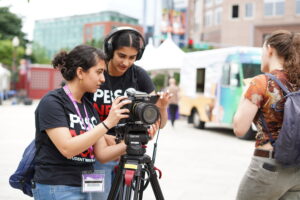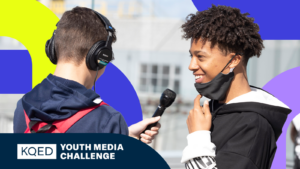We want to hear from students this #MedialitWk! Publish student stories with public media programs
Help students share their perspectives beyond the classroom and encounter the stories of youth nationwide with KQED’s Youth Media Challenge and PBS NewsHour Student Reporting Labs.
Public Media Partners Committed to Youth Voice
Student Reporting Labs is a hands-on journalism training program connecting young people to real-worldexperiences and educators to community and journalism/production resources in StoryMaker. Students learn to pitch a story, interview experts, film, edit and develop teamwork, empathy and listening skills. National and local mentors provide feedback and professional expertise. This year’s prompts, co-developed by our student advisory team, include: music, performance, and identity; gun violence; climate change; youth mental health.
KQED’s Youth Media Challenge invites middle and high school classrooms to create media to share stories, perspectives, and learning at any point during the school year. Three challenge projects focus on standards-based genres: Call for Change is a commentary project; First Person is a personal narrative project; and Show What You Know is an informational media project. The updated curriculum gives teachers flexibility and support to adapt the media projects across subject areas, including step-by-step resources in English and Spanish.
Publishing Opportunities for Middle and High School Students
Students are welcome to publish their pieces on KQED’s Youth Media Showcase and submit to Student Reporting Labs for national consideration. There is no need to choose one or the other — we want student work to have the biggest reach possible!
All student media is published on KQED’s Youth Media Showcase as it is submitted. Challenge submissions are accepted anytime throughout the school year and summer months. Each Youth Media Challenge project has a video, audio or image-based media option. Students are welcome to submit any of the accepted media types. For example, the Show What You Know informational media project accepts mini-documentaries, podcasts or infographics. Once on the showcase, pieces may be considered for publication by local public media stations, but not nationally.
For Student Reporting Labs, students and teachers can submit stories to Student Reporting Labs for national publication consideration through the StoryMaker prompts. Selected student stories may be published on the Student Reporting Labs website, shared on social media, distributed through media partnerships, and aired on local PBS stations and national PBS NewsHour nightly broadcasts. There are also strategies to publish with your school district, local media, and civic institutions. Students can also pitch a reported story idea outside of the prompt topic areas for production help and publication.
How to Publish
Publish on KQED’s Youth Media Showcase: All middle and high school students are invited to publish on KQED’s Youth Media Showcase. In order to submit, teachers or program leaders create an account on the showcase site and get a code, which students use to publish. Students do not create accounts. Students can publish individually or as a group. Submission instructions are the same for all projects and media types. The modifiable submission form template helps students get ready to publish, but all work must be submitted to the Youth Media Challenge site.
Submit to Student Reporting Labs: Elementary, middle, and high school students can submit stories for national publication consideration through each individual prompt on StoryMaker, there are instructions on how to pitch to different news organizations or publish on the school’s social channels and tag @studentreportinglabs.
Participate! Prompts and Projects Connect Classrooms Across Communities
If your students write or report about their lives, families or communities, consider KQED’s First Person project and these two Student Reporting Labs prompts. Music, dance, community and culture —students report stories in their community around how singing, dancing, performing and celebrating express culture and identity. Ready for the real world? wants to know how students feel prepared–or not–for the world outside of school.
Young people’s voices are leading the way on important issues that affect our lives. KQED’s Call for Change project asks students to choose an issue they care about and create a video or audio commentary or an editorial cartoon to share their views about that issue using their own experience and supporting evidence. Student Reporting Labs prompts this school year address some of the most pressing issues for youth:
- Run, hide, fight: growing up under the gun
- From bills to books: new laws aimed at what students learn and how they express themselves
- Statues, symbols and stories: how public spaces reflect America’s past and present
- Youth mental health
- Climate change in my community
More Support + Resources
Student Reporting Labs: find video and audio journalism resources across topic areas on StoryMaker, along with a community of practice of thousands of educators doing journalism with young people. To support SRL students and educators throughout the process, producers are available to consult with students on story pitches, scriptwriting, voice-over narration, rough cuts, and final videos. Contact the team here or book office hours here to get advice or feedback at any point during the reporting or production process.
Check out PBS Newshour Classroom with daily news lessons for students grades 6-12.
KQED Education: Find curriculum in English and Spanish and resources for implementing media projects from idea development to publication on the Youth Media Challenge site. KQED’s free online PD workshops support teachers in making and teaching video, audio, or image-based media. KQED Teach offers free self-paced online courses to help students analyze, evaluate and create media.
In your neighborhood: Local stories can have the greatest impact locally: share with more people in your school and local community! Here are some ideas on publishing locally and growing your audience from Student Reporting Labs, and how to share beyond the showcase from KQED.







